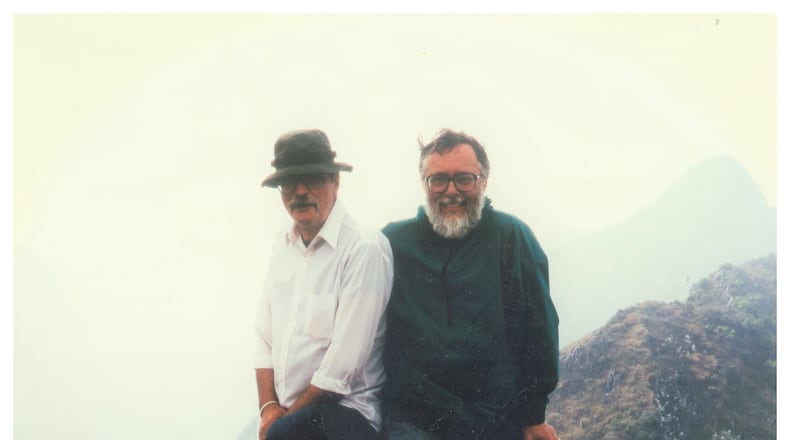A new book — The Monkey Brothers Adventures in Thailand — is all of those things as well as the story of two young men who met in a freshman college biology class and formed a friendship which has lasted for nearly six decades.
Don Kaufman and Mike Burgett have enjoyed a friendship that has lasted through college and their adult lives. Both have taught college science classes while living thousands of miles apart with different areas of specialization in the world of science. The book is co-written by the two men about a month they spent together in Thailand when Kaufman visited his friend there in 1996.
“The book is a whole lot about enduring friendship,” said Kaufman, an Oxford Twp. resident who is retired after a 50-year teaching career. “It has been really special to keep that going. We are really different people.”
In retirement, he keeps busy with a variety of endeavors, one of which is a book publishing company formed with Cecilia Berg. This book is a product of that company, Berg Kaufman Publishing.
Both men are natives of Pennsylvania and they met in that freshman biology class at Edinboro State Teachers College, now Edinboro University of Pennsylvania. That biology class was in their first semester of college in the fall of 1962.
Burgett lives in Corvallis, Oregon and is professor emeritus at Oregon State University. His career is centered on bees and he spends several months each year at Chiang Mai University in Chiang Mai, Thailand conducting basic and applied research on multiple species of bees. It was on one of those visits in 1996 that Kaufman was invited to conduct a seminar for faculty at that university on solving and preventing environmental problems which was the topic of a book he has co-authored with Berg.
Kaufman retired in 2016 from Miami University after 50 years of teaching at all levels from pre-k through grade school to college and graduate school.
The seminar at Chiang Mai was only one evening but Kaufman said he took the month off from teaching to extend the trip, not only to visit his friend but to experience Thailand.
“My teaching was getting a bit stale. I was determined to experience that culture to the fullest. I had been teaching for 30 years at that point and needed new examples in my teaching,” he said. “I was determined to do everything that came my way, with no schedule.”
The book looks at those experiences, offering a story anyone can enjoy. That no-schedule thing was illustrated on Kaufman’s first day at Chiang Mai. He arrived there on a Sunday and the plan had been for them to visit a research station the next day but when he got off the plane, he was greeted by Burgett who said they were leaving immediately.
“I had a 36-hour flight and Mike said we are going to the research station NOW,” he said. That was a 12-mile trip but involved slow-going over mountain roads, often more like trails. After dinner, Kaufman said he only wanted to go to sleep and did so on a mat in the corner, completely missing a late-night party in his honor. He slept 12 hours and the next morning, the band of six left for a camping trip up to the summit of a mountain. They made it to the top and camped for the night. The unusual title for the book came about as a result of that night’s discussion and sharing.
The six men discovered they had all been born in 1944, the Chinese year of the wood monkey.
According to Chinese astrology, each year is associated with an element (one of five) and an animal sign (one of 12). Combinations occur every 60 years so 1944 and 2004 were years of the wood monkey. People born under that combination are said to be compassionate, always ready to help others; they possess strong self-esteem but are stubborn.
In the book, he writes of that realization: “From the far recesses of my brain, I recall a bit of trivia. Some forty million people were born worldwide in 1944, and six of us are here tonight, sitting together on a mountaintop in Thailand, under a dome of glittering stars, swirling galaxies, shooting stars and random satellites, sharing a bottle of cheap whiskey and a priceless sense of fraternity. Life is good.”
The book shares a lot of insights about Thailand, its customs and daily life as well a wide array of food choices. As one example of that among many gastronomic options related in the book, Kaufman noted his breakfast the first morning at the research station was one of cabbage and porcupine soup.
He said the book came about after retirement and took more than three years to complete. He was the principal writer working from daily journal entries he wrote while in Thailand.
“When I retired, I had 35 ideas for books. For some, I had chapters outlined, some were just ideas. I wanted to see if Mike was interested in a book. He was all for it. He is an incredible scientist, but he does not keep records,” Kaufman said. “I would write one section as I remember it and send it to him. He would read it and send it back. He said, ‘I am really glad you have a journal.’ When we got the final manuscript, we turned it over to Cecilia Berg, our editor, and she began to polish it.”
Kaufman said he has never been back to Thailand since that month in 1996, which he sees in two ways. On the one hand, he said a second trip could never duplicate the memories of the first one but he is also curious about that country now and occasionally thinks about a return.
The Monkey Brothers Adventures in Thailand can be ordered at amazon.com or directly from Kaufman at bergkaufmanpublishing@gmail.com.
About the Author

